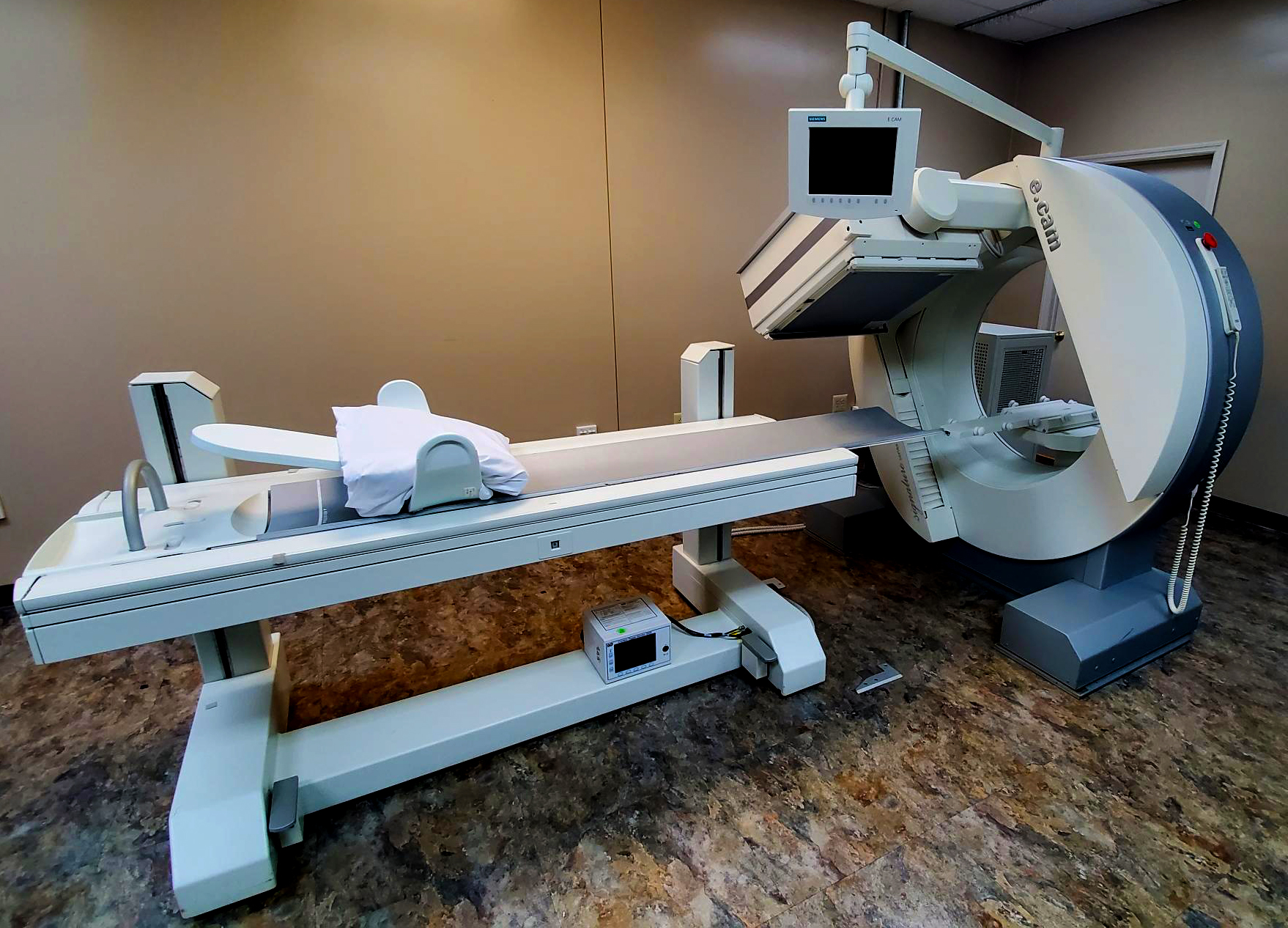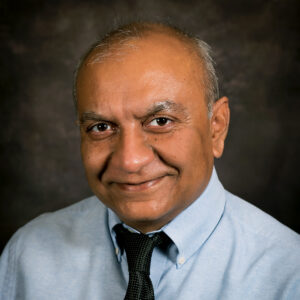
Appling Healthcare is proud to have a state-of-the-art nuclear medicine department, ensuring residents of Baxley, Georgia, and surrounding communities have access to all of the most needed diagnostic tests.
Nuclear medicine is a form of diagnostic testing that helps to determine function/dysfunction of various parts of the body with the utilization of radiopharmaceuticals. Our nuclear medicine tests are read by cardiologists and radiologists with many years of experience.
Testing is available Mondays through Fridays. Appling Healthcare Nuclear Medicine is located within the hospital facility, 163 E. Tollison St. in Baxley. For more information, call (912) 367-9841, ext. 1446. Centralized scheduling: (912)366-6002 or fax (912)367-1200.
Our Most Requested Tests:
A bone scan is a test that uses a small amount of radiopharmaceutical (imaging agent) which concentrates in areas of your bones that are the site of chemical or physical changes. A scanner then detects the radiation creating an image of the skeletal system. The test usually takes 4 hours to complete. Bone scans can help diagnose several problems, including:
A ventilation/perfusion lung scan, also called a VQ lung scan, uses radiopharmaceuticals (imaging agents) to evaluate the circulation of air (ventilation) and blood (perfusion) within a patient’s lungs. It is usually ordered if there is a suspected pulmonary embolism (blood clot). A VQ scan may show blood vessel blockages in your lungs and/or can detect regional differences in lung blood flow and air distribution. Doctors may use VQ scans to examine the lungs before some types of surgeries. This test takes 1 to 1.5 hours to complete.
A hepatobiliary iminodiacetic acid (HIDA) is a test used to evaluate your gallbladder by using a small amount of radiopharmaceutical (imaging agent). This agent allows you to demonstrate the flow of bile throughout your hepatobiliary system. It is most often done to evaluate the gallbladder, to measure the rate at which bile is released from your gallbladder (gallbladder ejection fraction). It’s also used to look at the bile-excreting function of your liver and to track the flow of bile from your liver into your small intestine. This test takes 2 to 4 hours to complete.
This is a test in which a radiopharmaceutical (imaging agent) is used to evaluate blood flow to your heart muscle while at rest and stress. This test helps to determine if your heart is getting sufficient blood flow whether resting or your heart is under stress (ex: exercised, when a demand is placed on your heart). If abnormalities are found, this test aids in the selection of an appropriate treatment plan. This test takes 3-5 hours to complete. LEARN MORE
This nuclear medicine exam is performed to evaluate the size, location, and overall functional level of the thyroid gland. The study is acquired using a small amount of radioactive iodine (I-123) which is ingested via a capsule. It is absorbed into the blood stream and accumulates in the thyroid gland in which a special camera detects the function of the gland. The structure of the gland is also determined/visualized with this exam. The exam takes two days to complete. LEARN MORE
A gastric empty test utilizes scrambled eggs/oatmeal injected with a radiopharmaceutical (imaging agent). The patient consumes the eggs and a special camera evaluates the movement of food through the gastric system. Gastric emptying scans are often used to diagnose gastroparesis, a condition in which the stomach’s muscles don’t work properly. This test takes approximately 2 to 4 hours to complete.
Melissa Smiley Hartley is a lifelong resident of Appling County and has spent 33 years working as a legal assistant, including her time with JohnsonFloyd LLP since 1999. She is actively involved through the Baxley-Appling County Chamber of Commerce, where she currently serves on the Board of Directors. Melissa is also a proud mother of two children, Jackson and Anna Kate.
Doug Harris is a native and lifelong resident of Appling County, where he graduated from Appling County High School. He graduated from Troy State University in Troy, Alabama, in 1978, with a major in Criminal Justice and a minor in Computer Science. He retired from Southern Nuclear, working at Plant Hatch for over thirty-six years in the Operations, Materials, and Training departments, having held a Reactor Operators License from the Nuclear Regulatory Commission and later a Senior Reactor Operators Certification. His public service includes being a former Appling County School Board member, where he represented the Georgia School Board Association as a Federal Relations Network member. He has also served as an Appling County Board of Commissioners member. In the mid-nineties, Doug was instrumental in attracting and obtaining the Altamaha Technical and Education Center, currently known as Coastal Pines Technical College. He is actively involved in his church, having served in various roles over many years. He is married to Betsy Crummey Harris of Baxley and has four grown children, spouses, and eleven grandchildren.
Madeline Rentz-Tucker, a native of Baxley, holds a Bachelor of Science degree from the University of Georgia and a Juris Doctor from Mercer University. She has practiced law in various settings and now works with a long-standing local law firm. Madeline and her husband, Matthew Tucker, a native of Ocilla, enjoy life in Baxley with their two dogs.
Cam Mayers is a native of Appling County and a graduate of Georgia Southern University’s Parker College of Business. He has worked for various industries here in Southeast Georgia and is currently a lender with Pineland Bank. He is actively involved in the community, serving on the Appling County Festival Committee, and is a recent graduate of the Appling Leads Leadership Program. Cam and his wife, Hannah Carter Mayer,s have two young daughters, Lillian and Bess.
Sloan Lott is a lifelong resident of Baxley. He has been employed by Bland Farms for 28 years and is currently their Director of Sales. He is married to Kendra Lott, and they have two daughters, Isabella and Amelia. He is a graduate of Georgia Southern University, where he obtained a Bachelor of Science in Biology. Sloan currently serves on numerous industry and charitable boards. He is a member of the executive board of directors forthe Southeast Produce Council and a member of the board for Society of St. Andrews.
Lee Lewis is the City Market Executive and Senior Vice-President for Pineland Bank in Baxley. He is a graduate of the University of Georgia from the Terry College of Business with a Bachelor of Business Administration in Finance. Lee is actively involved in his community, serving as Chairman of the Coastal Pines Technical College Board, Secretary of the Appling County Hospital Authority, Executive Board Member for the Coastal Georgia Council BSA, and Treasurer of the Appling County Tourism Board. In 2023, he was elected to the Board of Trustees for the Georgia Hospital Association. Lee is married to Melody Lewis, and they have one son, Hudson.

163 E. Tollison Street
Baxley, GA 31513
(912) 367-9841
Senior Care Unit (Behavioral Health)
Board Certified: General Psychiatry, American Board of Psychiatry and Neurology
Board Certified: Geriatric Psychiatry, American Association of Geriatric Psychiatry,
American Board of Psychiatry and Neurology
Medical School: Baroda Medical College and affiliated hospitals, Baroda, India
Internship: Baroda Medical College and affiliated hospitals, Baroda, India
Residency in Psychiatry: Medical College of Georgia and University of Pennsylvania
Fellowship: University of Pennsylvania,Geriatric Psychiatry Program

105 E. Tollison Street Suite D
Baxley, GA 31513
(912) 366-9688
Master of Science in Nursing, Family Nurse Practitioner: Georgia Southern University, Statesboro, GA
Bachelor of Science in Nursing: Georgia Southern University, Statesboro, GA
-Family Nurse Practitioner
-Registered Nurse, Georgia
-Basic Cardiac Life Support
-Advanced Cardiac Life Support
-Pediatric Advanced Cardiac Life Support
-ONS Chemotherapy/Biotherapy Provider Course
-American Academy of Nurse Practitioners
-Sigma Theta Tau International

105 E. Tollison Street Suite B
Baxley, GA 31513
(912) 367-0102
Medical School: University of Santo Tomas, Philippines
Residency: Memorial University/Mercer University Hospital, Savannah, GA
Internship: Memorial University/Mercer University Hospital, Savannah, GA
-Diplomate, American Board of Internal Medicine
-Certified, Medical Review Officer, Southern Nuclear Company
-Member, American College of Physicians
-Recognition with Commendation, American Medical Association

105 E. Tollison Street Suite B
Baxley, GA 31513
(912) 367-0102
Matt is a board-certified Family Nurse Practitioner who treats patients two years and older. He is a certified BioTE® medical provider for bioidentical hormone replacement therapy, including BioTE® hormone pellet therapy.
Master of Science in Nursing: South University, Savannah, GA (Family Nurse Practitioner)
Bachelor of Science in Nursing: Valdosta State University, Valdosta, GA
-Family Nurse Practitioner
-Registered Nurse, Georgia
-Advanced Cardiac Life Support
-Basic Life Support (BLS)
-Chemotherapy & Biotherapy Provider
-Oncology Nursing Society
-Sigma Theta Tau Honor Society of Nursing

105 E. Tollison Street Suite D
Baxley, GA 31513
(912) 366-9688
-Primary Care
-Well Checks
-Acute Care
-Physical Exams
-Disease Preventions
-Patient Education
Medical School: University of Santo Tomas, Philippines
Residency: Brookdale University Hospital, Brooklyn, New York
-American Board of Pediatrics